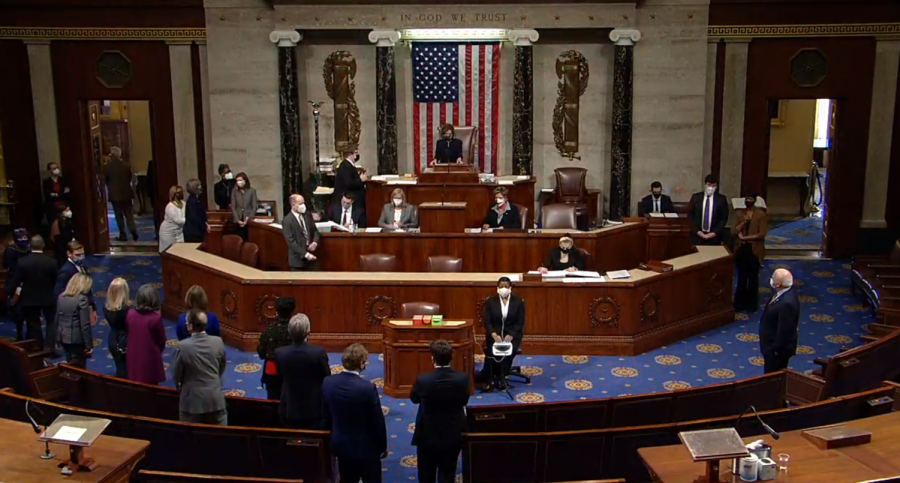The buck does not stop with the President: necessity for congressional investigation, censure, potential expulsion
US House of Representatives, (Wikimedia Commons)
The House of Representatives votes to adopt impeachment legislation on Jan. 13, 2021. Despite the unlikelihood of conviction before inauguration, congress should still investigate the members who incited insurrection through false claims of voter fraud.
January 15, 2021
President Trump will not be removed from office before Inauguration Day on Jan. 20, 2021. While the House impeached Trump on Jan. 13, making him the first President to be impeached twice, Republican Senate Majority Leader Mitch McConnell stated he will not bring the US Senate back before Jan. 19 and reconvening one day before Trump is scheduled to leave office is not enough time to conduct an impeachment trial. While impeachment is a necessary step towards remedying the damages towards democracy and setting an important precedent, it must be followed by congressional investigation, censure and potential expulsion.
Even with the impossibility of a Trump conviction, additional congressional action is still necessary; it is just necessary for different reasons. While President Trump’s incitement of insurrection, the first breach of the US Capitol since 1814 that left five dead, is certainly an impeachable offense, the necessity of additional action exists because of precedent. If steps are not taken to hold others accountable for their actions, it sets a dangerous precedent that officials can argue for the overthrow of democracy and get away with it.
Even after the deadly attack on the US Capitol, 147 congressional Republicans still voted to overturn the democratically elected President and Vice-President-elect of the United States despite no evidence of the voter fraud they cited. Their actions cannot go unnoticed.
These elected officials are just as responsible for the deaths at the US Capitol as the President. Not only did they lie about voter fraud, and incite violence, but they did it for political means.
Every single member of the Republican caucus who decided to try and overturn democracy ignored the fact that they were elected on the same ballot as Donald Trump. How can Paul Gosar of Arizona or Marjorie Taylor Greene of Georgia claim electoral fraud against the President in their states but accept victories in the same states?
In the US Senate, the political ambitions are even clearer. Both Texas Sen. Ted Cruz and Missouri Sen. Josh Hawley, the driving forces behind objecting to democracy, didn’t announce their objections until after the Electoral College took place and after almost every Trump lawsuit had been dismissed. Both Cruz and Hawley are 2024 hopefuls, proving that Cruz’s comments that, ‘We will not go into the night,’ and Hawley’s raised fist hours before the rioting began were appeals to the Trump base which lead to the deaths of 5 Americans.
Not only were objections to the outcome of the election politically motivated and without merit, they also added fuel to the fire of those wishing to invade the Capitol. On a fundamental level, one should not be able to actively endorse the violent overthrow of democracy and then attempt to operate as an elected official in that democracy.
In addition to controlling impeachment and conviction, the House and Senate also control the expulsion and censure of their own members. Expulsion requires investigation by each bodies’ respective ethics committees and then a 2/3s majority to expel. The Censure procedure is not formally written into The Constitution, but it allows for a strong condemnation of an official and typically leads to the loss of committee positions. Congress also has the ability to censure the president but in all cases, a censure is nothing more than a recorded condemnation.
Those who oppose censuring or expelling officials who objected to electoral results have cited democratic efforts made in previous presidential cycles. The difference, in this case, is that expulsion or censure would not be the result of electoral objections but by the result of actions that both indirectly and directly incited an insurrection and led to unnecessary death.
What is important to understand is that those who objected to democracy are not going to stop. They did not stop after 5 people died in the capitol and they have shown no signs of slowing down. At the very least, these elected officials need an asterisk, a constant reminder that they attempted to overthrow the democratically elected government of the United States.
The blood spilled inside the Capitol on Jan. 6 is on the hands of those officials, both elected and unelected, who continued to push the charade of election fraud and supported those who committed acts of domestic terrorism. If we do not act to hold these officials responsible, through investigation and whatever that leads to, the blood will be on all of our hands.







